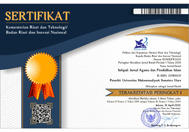Enhancing Learning Quality with Magic Box Media in Khulafaur Rasyidin Chapter: Primary Education in Indonesia
Abstract
Studying the historical aspects of Islamic culture is part of the elementary school curriculum in Indonesia under the subject of Islamic Religious Education. The large number of narratives in this material makes it difficult for students to understand. In this case, the classroom instructional process necessitates the utilization of diverse strategies and methods to attain specific learning objectives. This study involved the creation of the Magic Box learning tool with the goal of enhancing students' comprehension, particularly in relation to the content covering the exemplary stories of Khulafaur Rasyidin. This study is Research and Development (R&D) with a development design model using the ADDIE model: Analyze, Design, Development, Implementation, and Evaluation. The research product development yielded validation percentages of 92% and 94% from media and material experts, respectively. The outcomes of the media effectiveness assessment showed an average score of 0.82, classifying it within the high category. Additionally, the pre-test and post-test outcomes demonstrated a percentage range from 16% to 84%. The student response questionnaire results, with a percentage of 80%, fell within the high category.
Keywords
Full Text:
PDFReferences
Aeni, W. A., & Yusupa, A. (2018). Model Media Pembelajaran Komik Elektronik untuk SMA. Jurnal Kwangsan, 6(1). https://doi.org/https://doi.org/10.31800/jurnalkwangsan.v6i1.66
Alhamuddin, A., Andi Murniati, Eko Surbiyantoro, & Dewi Mulyani. (2021). Developing Core Competencies for Islamic Higher Education in Indonesia in the Era of Industrial Revolution 4.0. Jurnal Pendidikan Islam Indonesia, 5(2), 136–152. https://doi.org/10.35316/jpii.v5i2.279
Amiruddin, A., Nurdin, N., & Ali, M. (2021). Islamic Education Teacher Communication Strategy in Increasing Students ’Learning Interest. International Journal of Contemporary Islamic Education, 3(1), 41–61. https://doi.org/10.24239/ijcied.vol3.iss1.31
Arifa, L. N. (2022). The Internalization of Islamic Values During The Pre-Operational Stage Based on The Piaget Cognitive Psychology. Proceeding International Conference on Islamic Education "Integrated Science and Religious Moderation in New-Paradigm in Contemporary Education”.
Dewi, P. I. S., & Negara, I. G. A. O. (2020). Magic Box Media Assisted Rotating Trio Exchange (RTE) Learning Model Toward Social Science Competencies of the Fourth Grade Elementary School. Jurnal Ilmiah Sekolah Dasar, 4(3), 324. https://doi.org/10.23887/jisd.v4i3.25626
Ediyani, M., Hayati, U., Salwa, S., Samsul, S., Nursiah, N., & Fauzi, M. B. (2020). Study on Development of Learning Media. Budapest International Research and Critics Institute (BIRCI-Journal): Humanities and Social Sciences, 3(2), 1336–1342. https://doi.org/10.33258/birci.v3i2.989
Endah, R. A. (2017). Kreasi Cantik Exploding Box. Gramedia Pustaka Utama.
Faiz, A., & Purwati. (2021). Peran Filsafat Progresivisme dalam Mengembangkan Kemampuan Calon Pendidik di Abad-21. Jurnal Education and Development Institut Pendidikan Tapanuli Selatan, 9(1), 131–135.
Firmansyah, F. A. H., Subroto, T. W., & Hendratno, H. (2023). Development Of Argumentation-Based 3D Audio Visual Media Exploding Box To Improve Students ’ Critical Thinking In Elementary Schools. Jurnal Pendidikan, Bahasa Dan Budaya, 2(2). https://doi.org/https://doi.org/10.55606/jpbb.v2i2.1510 Development
Hakim, R., Ritonga, M., & Susanti, W. (2020). Implementation of Contextual Teaching and Learning in Islamic Education at Madrasah Diniyah. Jour of Adv Research in Dynamical & Conrol Systems, 12(02), 3326–3332. https://doi.org/10.5373/JARDCS/V12I2/S20201455
Hidayat, F., & Nizar, M. (2021). Model Addie (Analysis, Design, Development, Implementation and Evaluation) Dalam Pembelajaran Pendidikan Agama Islam. Jurnal Inovasi Pendidikan Agama Islam (JIPAI), 1(1), 28–38. https://doi.org/10.15575/jipai.v1i1.11042
Ilham, D. (2020). The Challenge of Islamic Education and How to Change. International Journal of Asian Education, 01(1), 9–20. https://doi.org/https://doi.org/10.46966/ijae.v1i1.16
Lafrarchi, N. (2020). Assessing islamic religious education curriculum in flemish public secondary schools. Religions, 11(3). https://doi.org/10.3390/rel11030110
Mahnun.Nunu. (2020). Media Pembelajaran (Kajian terhadap Langkah-langkah Pemilihan Media dan Implementasinya dalam Pembelajaran). Creative Education, 11(03), 262–274. https://doi.org/10.4236/ce.2020.113020
Mahyudin, A. (2023). Pengembangan Media Pembelajaran Canva Mata Pelajaran PAI & BP Fase C - Sekolah Dasar. 3(4), 169–177.
Masuwai, A., Zulkifli, H., & Tamuri, A. H. (2022). Systematic literature review on self-assessment inventory for quality teaching among islamic education teachers. Sustainability (Switzerland), 14(1). https://doi.org/10.3390/su14010203
Nasriya, T. Z., Wuryandani, W., & Mulyono, M. (2021). Explosion Box as Learning Media of Ecosystem Components for Elementary School Student. Jurnal Pendidikan Progresif, 11(2), 338–348. https://doi.org/10.23960/jpp.v11.i2.202115
Sistem Pendidikan Nasional, Pub. L. No. Undang-Undang RI Tahun 2003 (2003).
Nursyahidin, R., Rohman, A., & Febriyanti, N. (2021). Learning Innovation of Islamic Education in Covid-19 Pandemic. Jurnal Pendidikan Agama Islam, 18(1), 145–166. https://doi.org/10.14421/jpai.2021.181-08
Pribadi, B. A. (2014). Desain dan Pengembangan Program Pelatihan Berbasis Kompetensi Implementasi Model ADDIE (1st ed.). Prenadamedia Group.
Rahmawati, R., Rosita, & Asbari, M. (2022). The Role and Challenges of Islamic Religious Education in the Age of Globalization. Journal of Information Systems and Management (JISMA), 01(01), 6–11.
Rukin. (2019). Metodologi Penelitian Kualitatif. Yayasan Ahmar Cendekia Indonesia.
Sugiyono. (2017). Metode Penelitian Kuantitatif, Kualitatif, dan R&D. Alfabeta.
Supena, I., Darmuki, A., & Hariyadi, A. (2021). The Influence of Learning Model on Students’ Learning Outcomes. International Journal of Instruction, 14(3), 873–892.
Sutrisno, S., & Nasucha, J. A. (2022). Islamic Religious Education Project-Based Learning Model to Improve Student Creativity. At-Tadzkir: Islamic Education Journal, 1(1), 13–22. https://doi.org/10.59373/attadzkir.v1i1.3
Tolchah, M., & Mu’ammar, M. A. (2019). Islamic education in the globalization era; challenges, opportunities, and contribution of islamic education in indonesia. Humanities and Social Sciences Reviews, 7(4), 1031–1037. https://doi.org/10.18510/hssr.2019.74141
Tsanidya, D. N. (2019). Pengembangan Media Magic Box Materi Perubahan Wujud Benda dan Sifatnya Kelas V SDN 3 Kunduran Blora. Universitas Negeri Semarang.
Winarto, W., Syahid, A., & Saguni, F. (2020). Effectiveness the Use of Audio Visual Media in Teaching Islamic Religious Education. International Journal of Contemporary Islamic Education, 2(1), 81–107. https://doi.org/10.24239/ijcied.vol2.iss1.14
Zaman, B. (2020). Implementation of Cooperative Learning Strategies in Islamic Religious Education. IJECA International Journal of Education & Curriculum Application, 3(2), 91–97.
Zuhaeriah, Z., Ali, M., & Yusra, Y. (2020). The Role of Islamic Education Teachers Competency in Improving the Quality of Education. International Journal of Contemporary Islamic Education, 2(1), 108–130. https://doi.org/10.24239/ijcied.vol2.iss1.15
Zulkifli, H., Tamuri, A. H., & Azman, N. A. (2022). Understanding creative teaching in twenty-first century learning among Islamic education teachers during the COVID-19 pandemic. Frontiers in Psychology, 13. https://doi.org/10.3389/fpsyg.2022.920859
DOI: https://doi.org/10.30596/17446
Refbacks
- There are currently no refbacks.
Intiqad Jurnal Agama dan Pendidikan Islam is abstracting & indexing in the following databases:
View My StatsEditorial Address:
Faculty of Islamic Religion, Universitas Muhammadiyah Sumatera Utara. Jl. Mukhtar Basri No. 3 Medan 20238 Telp. (061) 6622400 ext. 27 dan 28 Fax. (061) 6625474. e-mail: intiqad@umsu.ac.id

_(1).png)























